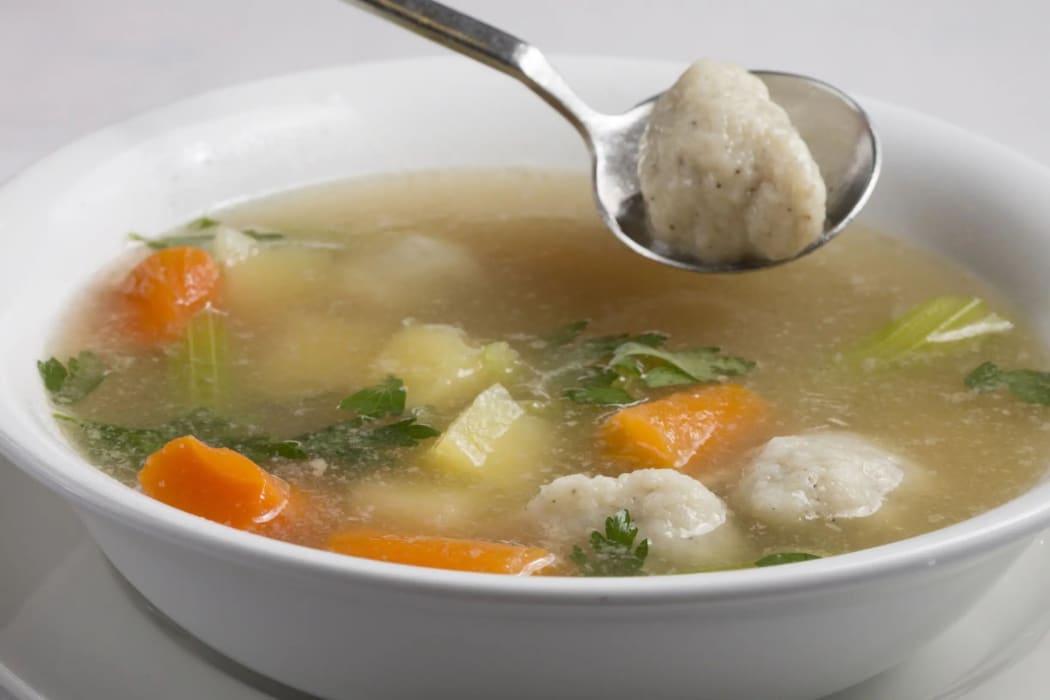Ashkenazi Chicken Soup

Ashkenazi Chicken Soup Photo: Public domain
Serves 6
This recipe is based on the traditional Ashkenazi (Central/Eastern European) Jewish Chicken Soup, which is commonly made with dumplings called matzo balls. Matzo is the traditional unleavened 'bread' eaten by Jews during the holiday of Passover to recognise the haste with which the Jewish slaves escaped Egypt in the old story of the Exodus. It is a little bit like a large water cracker and is ground to a sort of rough flour call matzo meal, which the matzo ball dumplings are made from. For those who grew up on it this is real comfort food, but matzo meal is not easy to get hold of in New Zealand and to be honest it is not particularly flavoursome. When I came to replicate the soup at the restaurant I found the matzo balls unsuitable so I've developed my own version, my Kiwi matzo balls, with chicken meat and semolina. The soup itself is a very rich chicken stock with few vegetables. When the dumplings are cooked in the soup the semolina absorbs the soup liquid with all its flavour, which makes the dumplings very light and tasty. Note the preparation steps in this recipe; you may wish to begin a day before you plan to serve it.
Ingredients
For the soup:
- 1 whole chicken (preferably free-range, and even better if you can get a boiler)
- 6 onions
- 6 medium carrots
- 2 large potatoes, whole, skins on, cleaned
- 6 celery stalks
- 3 bay leaves
- 3 courgettes
- 2-3 sprigs of dill, chopped, for garnish
For the Kiwi matzo balls (chicken dumplings):
- 350g minced chicken (or the meat from the soup chicken once cooked, plus one egg)
- 1 cup semolina flour
- 2 Tbsp finely chopped Italian flat-leaf parsley
- 2 Tbsp finely chopped dill
- 1 tsp flaky salt
- Black pepper to taste
Method
Prepare the stock:
Rinse the chicken and place it in a large (10-15 litre) stockpot. Cut the onions into quarters, leaving the skins on. Peel the carrots, and cut each one into three lengths. Place the onion, carrots, whole potatoes, celery sticks, and bay leaves into the pot with the chicken, add enough water to cover by 2 inches and bring to the boil. Reduce the heat to the lowest setting and cook uncovered for at least six hours, skimming regularly to remove all the impurities that float to the top. Top up with additional water to cover if needed.
Remove the chicken and vegetables from the stock and set aside. Set a sieve above another large pot and strain the liquid to remove any further impurities and debris. Add the onions and celery to the sieve and push on them to extract their juices, then discard the spent vegetables and bay leaves. Reserve the chicken (if using), carrots, and potatoes for later use.
Ideally, you would now chill the stock in the refrigerator for a few hours or overnight. The fat will float to the top and solidify, which will make it easy to remove. Alternatively, skim the fat from the top as best you can with a spoon.
Once you are ready to continue, slice the courgettes, and dice the reserved cooked carrots and potatoes into one-centimetre cubes. Heat the stock and chopped vegetables in a large pot on low heat and season with salt and pepper to taste.
Make the dumplings:
If using the boiled chicken meat for the dumplings, remove it from the bones and pulse in a food processor with the egg until chopped into small pieces. Combine all of the dumpling ingredients in a large bowl. Scoop out a heaped tablespoon at a time and roll firmly but gently between your palms to form walnut-sized balls. Drop the dumplings carefully into the soup and gently simmer for 15 minutes, until puffed up and cooked through. Skim the soup regularly during this time to remove impurities. Taste again for salt and pepper, then serve immediately, sprinkled with chopped dill.
Make ahead: Soup will keep well in the refrigerator for 2-3 days.